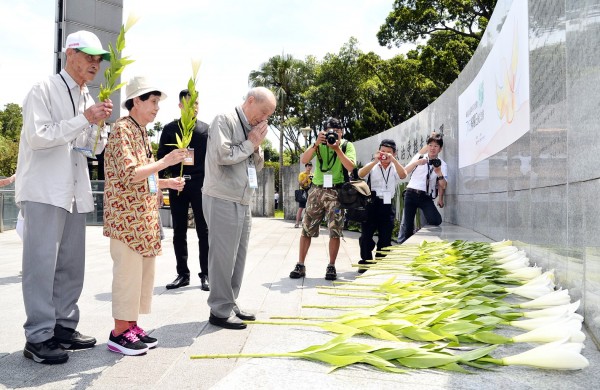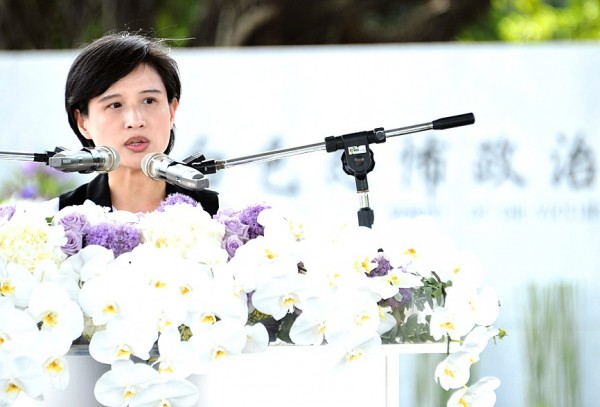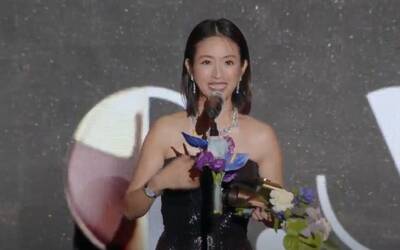《TAIPEI TIMES》 End of Martial Law: Museum of human rights bill mooted

Victims of the White Terror yesterday present flowers at a monument in Jieshou Park near the Presidential Office Building in Taipei to mark the 30th anniversary of the end of martial law. Photo: Chen Yi-chuan, Taipei Times
SILENT PROTEST The Taiwan Area Political Victims Mutual Help Association boycotted an anniversary ceremony, saying that they would not have been allowed to speak
By Abraham Gerber / Staff reporter
A bill to establish a human rights museum as an official government agency is to be sent to the Legislative Yuan next week, Minister of Culture Cheng Li-chiun (鄭麗君) said yesterday at a ceremony commemorating the 30th anniversary of the lifting of martial law.
Dozens of academics and victims of the Chinese Nationalist Party’s (KMT) White Terror era placed white lilies in front of a monument to the victims of the White Terror in Jieshou Park (介壽) near the Presidential Office Building in Taipei.
“While the museum was designed as an administrative institution, we have decided to institutionalize it as an official government agency,” she said, adding that the museum would work with civic groups to promote transitional justice, and that it would administer two upgraded human rights parks on Green Island (綠島) and in New Taipei City’s Jingmei District (景美), which were formally prisons.
The ministry “respected” a last-minute decision of the Taiwan Area Political Victims Mutual Help Association to boycott yesterday’s ceremony, Cheng said.
Many seats were empty at the ceremony, following the group’s withdrawal from events. The group represents many former Taiwanese Communist Party members, who were a major target in the White Terror era.
“We respect the stand taken by every group, but we hope that human rights can transcend different political stances and historical memories as we push toward transitional justice,” she said.
“White Terror victims include those on the left and right, advocates of unification and independence, as well as members of all ethnic groups; but even if there are different historical memories and political stances, human rights should spur us toward creating a common democratic foundation on these differences,” she added.
Association president Tsai Yu-jung (蔡裕榮) said his group decided not to participate because it disagrees with the Democratic Progressive Party’s (DPP) “anti-communist” policies directed at China.
“If we had come, they would not have allowed us to speak,” he said, adding that it plans to hold its own separate memorial service. “We decided not to rain on their parade with protests by instead choosing not to participate.”
Preparatory Office of the National Human Rights Museum director Wang Yi-chun (王逸群) said he was “surprised” over the decision, adding that the association had previously regularly participated in ministry events and had not contacted the ministry with their concerns before announcing the boycott.
“In the past decade the platform we provide has never sought to suppress or change their description of history or how it should be interpreted,” he said. “If they refuse to take advantage of opportunities to offer their point of view because of ideological concerns, how do they intend to realize the historical justice they advocate?”
Association members maintain that the White Terror era should be viewed as an extension of anti-communist oppression during the Chinese Civil War, linking the lifting of martial law to the thawing of cross-strait relations in the 1980s.
White Terror victim Tsai Kun-lin (蔡焜霖), who was jailed for 10 years in the 1950s for participating in a book discussion group and distributing pro-communist leaflets, blasted KMT claims that the lifting of martial law was an achievement reflecting former president Chiang Ching-kuo’s (蔣經國) “benevolent rule.”
“The 38 years of martial law broke a world record at a time when Taiwan was not at war and did not face any domestic rebellion — it was only lifted after the rise of domestic ‘people power’ and the international environment coalesced into a powerful wave of pressure that forced Chiang Ching-kuo’s hand,” he said, adding that the KMT was “taking out its hatred, anger and sadness on the people because it lost its Chinese homeland.”
新聞來源:TAIPEI TIMES

Minister of Culture Cheng Li-chun yesterday attends a ceremony to mark the 30th anniversary of the end of martial law at Jieshou Park near the Presidential Office Building in Taipei. Photo: Chen Yi-chuan, Taipei Times

















